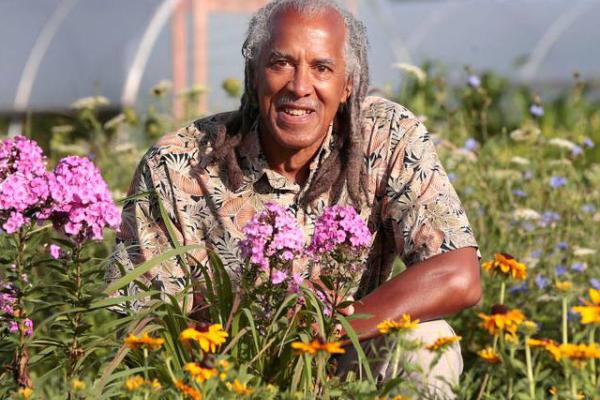
On Friday, February 16th, the Department of Comparative Studies and campus-wide partners invite you to join us in hearing and learning from eco-activist farmer Jim Embry!
Please RSVP via the appropriate link:
A longtime civil rights activist, Jim is also an active participant of the Slow Food movement and was most recently awarded a James Beard Foundation Leadership Award this past June for his 60+ years of food system activism and visionary leadership. Jim will be engaging with various members of the OSU community on prior to and following his lecture, sharing pathways to a sustainable future which frames our food and agriculture system as the fulcrum point for social transformation and the foundation of developing sustainable communities. These overlapping and interconnected pathways include: Earth Centric/Woman Centric; Indigenous Wisdom; George Washington Carver; Youth/Art/Hip Hop; Seeds/Terra Madre; Transformative Vision.
Jim has been researching, speaking, and writing about George Washington Carver the last 12-15 years (e.g., https://foodjusticeexhibit.wvu.edu/food-justice-in-appalachia/identity-and-community/dr-george-washington-carver). Moreover, he has personal family connections with Carver: “I have personal family connections with Carver that go back to the 1900s with my great grandfather, DB Ballew, who brought Carver to Richmond Kentucky three times along with WEB DuBois and Ida B. Wells." Rooted in his long-standing engagement with the land, we anticipate that Jim's lecture will masterfully weave themes that are certainly relevant in today's ever-changing world, including but not limited to cultivating care for the land and each other; diversity, equity, inclusion, and justice within and outside of the food system; and what we can learn from the past to imagine a prosperous tomorrow.
"Relevance of George Washington Carver as a Necessary Pathway to a Sustainable Future"
Albert Einstein is quoted roughly as saying: “We can't solve today's problems using the way of thinking that created them.”
George Washington Carver gifted us with this quote: “I love to think of nature as an unlimited broadcasting station through which God speaks to us every hour, if you only tune in.”
I believe that Carver and Einstein, who were friends, gifted us not only with their scientific genius, but they also provide, largely untapped, guidance for how we can get into right relationship with the Earth. They both serve as inspirations for my work which seeks to amplify such wisdom that remains so very relevant and necessary today. Consequently, I feel honored and blessed for this opportunity to engage in conversation with the OSU community around this question of right relationship, which is the most fundamental challenge for us as a species in this century.
We must not only unlearn the archaic aspects of our predominant world view, but also forge new conceptual frameworks and tools that guide us past colonial modernity while germinating the seeds for a leap in our maturation as a species.
We stand at a critical moment in Earth's history, when humanity must choose its future. We must recognize that we are one human family, and one Earth community with a common destiny. Human beings have the capacity to be very creative and imaginative under the right conditions. We need to create an exciting, inspiring, and joyful image of the future that pulls us forward and inspires others to join in the creation of a more just and sustainable world. This sacred work or Great Work, per Thomas Berry, will require a deep re-imagination of what human existence and culture is about. To make positive change in a world where change is constant, scholars, leaders in every realm, and community activists must be able to respond responsibly and constructively to increasingly unpredictable circumstances with overlapping pandemics. How do we prepare these next generations to become Imagineers: The Architects of the Future and not Defenders of the past?
It essential that universities think and act not just out-of-the-box but out-of-the-barn to lead and nurture our transition to a sustainable future which ensures that we then become good ancestors. Come learn, laugh, and leave with inspiration for our collective work ahead.
Please RSVP via the appropriate link:
Learn more about Jim here!
We are grateful to our co-sponsors and campus/area partners in support of this lecture:
- Department of African American and African Studies | College of Arts and Sciences
- Department of Anthropology | College of Arts and Sciences
- School of Environment and Natural Resources | SENR
- Humanities Institute | College of Arts and Sciences
- Center for Belonging and Social Change | Office of Student Life
- College of Food, Agricultural, and Environmental Sciences | CFAES
- Food, Culture and Society Certificate | College of Arts and Sciences
- Hale Black Cultural Center | Office of Diversity and Inclusion
- Marketing and Communications | College of Arts and Sciences
- Office of Diversity and Inclusion | ODI
- Slow Food Columbus
